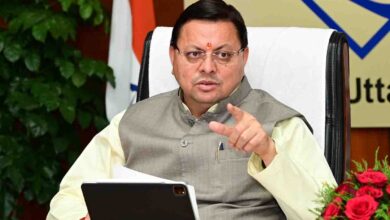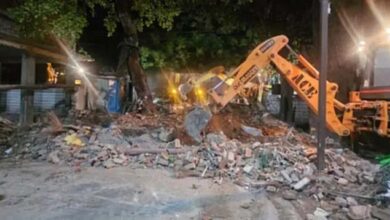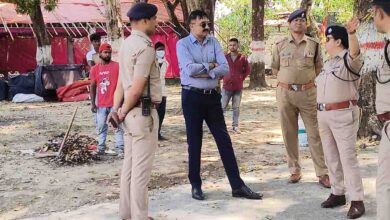Pioneer Talk: Immediate & long term Covid plan for coming months necessary, stresses SDCF Founder

Friday, 09 October 2020 | PNS | Dehradun
The authorities need to have both long term and immediate plans to deal with the pandemic of Covid-19 as there appears to be no respite from the disease for next eight to nine months. In this planning optimum use of human resources is available and the fatigue factor of the health workers should be considered. The founder of the Social Development for Communities Foundation (SDCF), Anoop Nautiyal said this during an online interaction with The Pioneer on Thursday. He was of the view that better community participation is needed to tackle the disease and the government should take leaders of political parties, student organisations, community groups and religious leaders on board for waging a war on the contagion. On performance of Uttarakhand government on the pandemic front Nautiyal said that in the initial phases the performance was better as compared to later stages. He pointed out that the nine mountainous districts have performed much better than the districts located in plains and higher community participation in dealing with the disease was observed in the mountainous areas. Emphasising on three Ts – testing, tracing and treatment- for combating the pandemic, Nautiyal said that it is unfortunate that the state has witnessed wide variation in number of testing. “For analysis we took three blocks of seven days each from September 15 to 21, September 22 to 28 and from September 29 to October 5 and found that there has been a reduction of 35 per cent in the last block. Furthermore on October 2 we found that only 19 cases were reported in six districts of Kumaon division while 292 cases were reported on the same day in the rest of the state. In Nainital district, only two cases were reported on October 2 while a day later about 60 cases were reported. These wide variations are unacceptable and the state needs to audit its testing process and provide additional support to the testing staff,’’ he said. On the question of community level transmission of the disease, Nautiyal said that there is no clear cut definition of community level of transmission but added that from May 22, the state health department had stopped giving information about the travel history of the positive patients. The patients being reported now have no travel history. He said that one cannot say about the peak of the disease but added that 9,749 cases of Covid-19 were reported in the 27th week (September 13 to September 19) since the outbreak of the disease on March 15 which was the highest weekly cases. Nautiyal said that though less cases of the disease are being reported recently we should not become relaxed. “We face two big challenges on the disease front. The first is the upcoming festival season where there would be increased public interaction and second is the winter season when the disease could witness a spike. At present there are three ‘vaccines’ for Covid-19, these are use of masks, maintaining the necessary physical distancing and sticking to the hand hygiene regime,’’ he said.
On the question of state government allowing tourism and the threat created by the tourists for spreading the disease, the founder of SDCF said that the decision is a calculated risk. He said that Uttarakhand suffered a loss of 42 per cent in GST revenues from April to July which is highest in the country and in such a situation the state government had no option but to allow tourism without restrictions. Nautiyal said that a perception is getting created in the general public that there is no need to be afraid of the disease which is dangerous. He said that the government should involve leaders of all political parties, youth organisations, religious leaders and public representatives in creating awareness in the society and a sort of public movement should be generated against the disease.
Talking about increasing plastic waste in the State during the pandemic, Nautiyal said that several efforts were made by government and activists among others to spread awareness among people to discard the use of plastic last year which became a movement and influenced many in Dehradun. However, these efforts were diluted after the Covid-19 pandemic hit the State, stated Nautiyal. “The government, businessmen in marketplaces and people of society play an important role in the proper disposal of plastic waste,” said Nautiyal. The businessmen in general have not shown any inclination or support towards the issue of disposal of plastic waste in the State, he opined. According to him, the legislation of governments also tends to stall the efforts against the disposal of plastic waste in some way which puts this responsibility on the shoulders of common people. “The people have the ability to change or influence the decisions of the government. We should not underestimate ourselves and should raise our voices at our level on such issues by various means like social media platforms,” said Nautiyal. He informed that only about nine per cent of plastic manufactured in the world has been recycled so far, therefore one should not feel content while using a recycled product. Rather, one should focus on minimising the consumption of plastics.
Talking about his experience regarding the installation of 12 plastic banks in Dehradun and in Rishikesh, Nautiyal said that installation of plastic banks is a small experiment that shows the plastic waste disposal can be done efficiently with a proper plan. “It is a very simple management of domestic plastic waste but such plans and efforts should be made regularly for plastic waste disposal. For instance, IIM Kashipur has recently started a plan in association with a recycling organisation to recycle PPE kits to make bricks. Also, the Council of Scientific and Industrial Research-Indian Institute of Petroleum (CSIR-IIP) has also developed a technology to recycle PPE kits,” said Nautiyal.
As per the State Government figures, there is 26 lakh metric tonne of legacy waste in various dumpsites of Uttarakhand. It is appreciable that the government has announced its intention to dispose of this waste but it is also important to ensure a robust garbage segregation plan besides using the technique of circulation waste in the State.
Talking about a waste generation from tourism activities, Nautiyal said that people need to be more responsible and opined that the State should focus on sustainable tourism rather than mass tourism.






